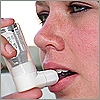
People with "mild persistent asthma" appear to gain adequate relief by inhaling anti-inflammatory steroids only during periods of bad symptoms, rather than daily as current guidelines recommend, a new study shows.
About a quarter of all asthma sufferers have mild persistent asthma, experiencing symptoms such as wheezing, coughing, or chest tightness two to six days of the week, or awakening due to asthma two or three times a month. Conventional treatment usually requires two prescribed drugs: a "beta agonist" for immediate relief, and daily use of inhaled corticosteroids to reduce airway inflammation and minimize risk of severe asthma attacks and airway scarring that might permanently reduce lung capacity.
But the year-long controlled study shows that adult asthma sufferers fare about as well whether they take a steroid drug every day or only during asthma attacks. Changes in lung function, overall frequency of symptoms and the number of severe attacks were about the same, whichever regimen was followed.
According to one of the study's authors, if the estimated four million people with mild persistent asthma took inhaled steroids only when symptoms flared, the annual medication costs would be about $2 billion lower -- or up to $150 a month per patient less -- than if they took the steroids every day as current National Institutes of Health (NIH) guidelines recommend.
The multi-center study, known as the Improving Asthma Control Trial (IMPACT), was funded by the National Heart, Lung and Blood Institute, and led by scientists at UCSF and Harvard Medical School.
The results are published in the April 14 issue of
The New England Journal of Medicine. The issue also includes an
editorial on the study and its likely impact on treatment for asthma.
There is no question that use of inhaled corticosteroids or other anti-inflammatory drugs known as anti-leukotrienes are effective -- and necessary -- for patients with moderate or severe asthma, but our findings suggest that the NIH guidelines for treating asthma may have gone a little too far in requiring patients with truly mild asthma to take these anti-inflammatory drugs every day," said
Homer Boushey, professor of medicine at UCSF and study co-leader.
Further Study Needed
"This study will need confirmation before the findings should change the standard of practice, but it suggests that adults with mild asthma may do about as well if they have the medication on hand and are advised to take them for a week or two just when their symptoms flare up."
About 20 million Americans suffer from asthma, with most experiencing symptoms that are considered "mild intermittent" or "mild persistent" -- requiring occasional use of beta agonists to relieve symptoms but causing few emergency department visits or hospitalizations. Opinion has been divided among experts as to how best to treat these conditions. In 1997, an expert NIH panel recommended daily use of inhaled steroids to prevent attacks, and theoretically, to counter the possibility of permanent, debilitating airway scarring which would further aggravate breathing. But only about 30 percent of patients who are prescribed inhaled steroids refill their prescriptions.
"The steroids do not provide immediate relief; that's the job of the beta agonists such as albuterol," Boushey explained. "Either because patients experience no obvious, immediate benefit, or because they are concerned about using inhaled steroids -- or some combination of reasons -- most people discontinue steroid use for asthma. Our study shows that for mild asthma, at least for the short term, this 'folk wisdom' is a safe practice.
"We can't say for sure though that inhaled corticosteroid treatment might not be good for preventing airway 'scarring' and progressive loss of pulmonary function in the long run. What we can say is that the patients in our study, who all had mild asthma, did not have many severe attacks, and did not seem to be losing pulmonary function rapidly."
The researches noted that patients who used the corticosteroids daily did experience some benefits: "They had more symptom-free days and less bronchial inflammation. But daily use of the steroids did not significantly reduce the risk of severe attacks or prevent loss of pulmonary function," Boushey stressed.
Source: Wallace Ravven
Related Links
Full Press Release

